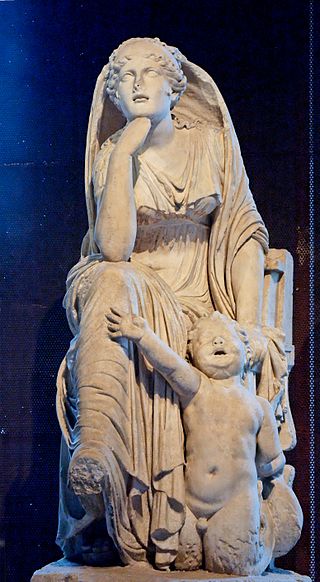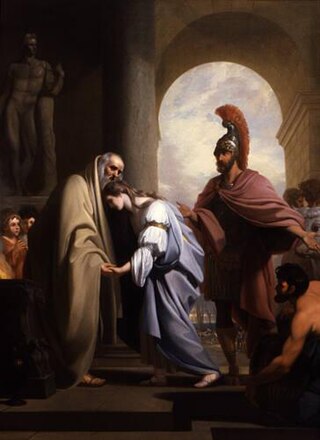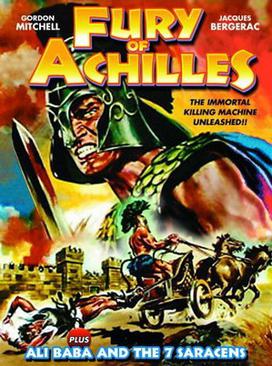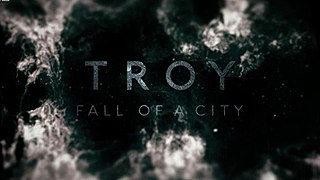
In Greek mythology, Achilles or Achilleus was a hero of the Trojan War who was known as being the greatest of all the Greek warriors. A central character in Homer's Iliad, he was the son of the Nereid Thetis and Peleus, king of Phthia and famous Argonaut. Achilles was raised in Phthia along with his childhood companion Patroclus and received his education by the centaur Chiron. In the Iliad, he is presented as the commander of the mythical tribe of the Myrmidons.

Thetis is a figure from Greek mythology with varying mythological roles. She mainly appears as a sea nymph, a goddess of water, and one of the 50 Nereids, daughters of the ancient sea god Nereus.

Briseis, also known as Hippodameia, is a significant character in the Iliad. Her role as a status symbol is at the heart of the dispute between Achilles and Agamemnon that initiates the plot of Homer's epic. She was married to Mynes, a son of the King of Lyrnessus, until the Achaeans sacked her city and was given to Achilles shortly before the events of the poem. Being forced to give Briseis to Agamemnon, Achilles refused to reenter the battle.

In Greek mythology, Chryseis is a Trojan woman, the daughter of Chryses. Chryseis, her apparent name in the Iliad, means simply "Chryses' daughter"; later writers give her real name as Astynome (Ἀστυνόμη). The 12th-century poet Tzetzes describes her to be "very young and thin, with milky skin; had blond hair and small breasts; nineteen years old and still a virgin".

In Greek mythology, Eurybates may refer to the same or different herald(s) for the Greek armies during Trojan War:

Troy is a 2004 epic historical war film directed by Wolfgang Petersen and written by David Benioff. Produced by units in Malta, Mexico and Britain's Shepperton Studios, the film features an ensemble cast led by Brad Pitt, Eric Bana, Sean Bean, Brian Cox, Brendan Gleeson and Orlando Bloom. It is loosely based on Homer's Iliad in its narration of the entire story of the decade-long Trojan War—condensed into little more than a couple of weeks, rather than just the quarrel between Achilles and Agamemnon in the ninth year. Achilles leads his Myrmidons along with the rest of the Greek army invading the historical city of Troy, defended by Hector's Trojan army. The end of the film is not taken from the Iliad, but rather from Quintus Smyrnaeus's Posthomerica, as the Iliad concludes with Hector's death and funeral.
In Greek mythology Phthia was a city or district in ancient Thessaly. It is frequently mentioned in Homer's Iliad as the home of the Myrmidons, the contingent led by Achilles in the Trojan War. It was founded by Aeacus, grandfather of Achilles, and was the home of Achilles' father Peleus, mother Thetis, and son Neoptolemus.

Talthybius was herald and friend to Agamemnon in the Trojan War. Talthybius is a Greek soldier who serves as both a messenger and a herald during the time of the Trojan War. Only two mortal men are present in Euripides’ play The Trojan Women, and Talthybius is the one who interacts with the Trojan women the most. Although he represents a hostile nation, he surprisingly shows his vulnerable side and affection towards these women. Even though he must obey orders he does make an effort to lessen their suffering. Talthybius is a complex character who tries to be empathetic despite enabling the rape and enslavement of Troy's women.

Louis Hersent was a French painter.
The Cypria is a lost epic poem of ancient Greek literature, which has been attributed to Stasinus and was quite well known in classical antiquity and fixed in a received text, but which subsequently was lost to view. It was part of the Epic Cycle, which told the entire history of the Trojan War in epic hexameter verse. The story of the Cypria comes chronologically at the beginning of the Epic Cycle, and is followed by that of the Iliad; the composition of the two was apparently in the reverse order. The poem comprised eleven books of verse in epic dactylic hexameters.

The relationship between Achilles and Patroclus is a key element of the stories associated with the Trojan War. In the Iliad, Homer describes a deep and meaningful relationship between Achilles and Patroclus, where Achilles is tender toward Patroclus, but callous and arrogant toward others. Its exact nature—whether homosexual, a non-sexual deep friendship, or something else entirely—has been a subject of dispute in both the Classical period and modern times. Homer never explicitly casts the two as lovers, but they were depicted as lovers in the archaic and classical periods of Greek literature, particularly in the works of Aeschylus, Aeschines and Plato.

Achille et Polyxène is a tragédie lyrique containing a prologue and five acts based on Virgil's Aeneid with a French libretto by Jean Galbert de Campistron. The opera's overture and first act were composed by Jean-Baptiste Lully, who died from a conducting injury before he could complete the score. The prologue and the remaining acts are the work of his pupil Pascal Collasse who finished the work, eight months after Lully's death on 22 March 1687. Acts 1 and 4 of the ballet was created by Louis Lestang, and the ballet to the prologue and acts 2 and 3 were by Louis-Guillaume Pécour. The opera was first performed on 7 November 1687, by the Paris Opera at the Théâtre du Palais-Royal in Paris.

The House of the Tragic Poet is a Roman house in Pompeii, Italy dating to the 2nd century BC. The house is famous for its elaborate mosaic floors and frescoes depicting scenes from Greek mythology.
In Greek mythology, Eudoros was the second of Achilles' five commanders at the Trojan War.

The Iliad is one of two major ancient Greek epic poems attributed to Homer. It is one of the oldest extant works of literature still widely read by modern audiences. As with the Odyssey, the poem is divided into 24 books and was written in dactylic hexameter. It contains 15,693 lines in its most widely accepted version. Set towards the end of the Trojan War, a ten-year siege of the city of Troy by a coalition of Mycenaean Greek states, the poem depicts significant events in the siege's final weeks. In particular, it depicts a fierce quarrel between King Agamemnon and a celebrated warrior, Achilles. It is a central part of the Epic Cycle. The Iliad is often regarded as the first substantial piece of European literature.

L'ira di Achille, internationally released as The Fury of Achilles, is a 1962 Italian historical drama set in the ninth year of the Trojan War and is based primarily on Homer's Iliad. The film was directed by Marino Girolami and starred Gordon Mitchell as Achilles. It was released in the UK in 1963 as ACHILLES and was filmed in EuroScope and Eastman Color.

The Song of Achilles is a 2011 novel by American writer Madeline Miller. Set during the Greek Heroic Age, it is a retelling of the Trojan War as told from the perspective of Patroclus. The novel follows Patroclus' relationship with Achilles, from their initial meeting to their exploits during the Trojan War, with focus on their romantic relationship. In 2012, The Song of Achilles was awarded the Orange Prize for Fiction.

The Painter of the Berlin Dancing Girl was an Apulian red-figure vase painter, who was active between 430–410 BC. He was named after a calyx krater in the collection of the Antikensammlung Berlin, which depicts a girl dancing to the aulos played by a seated woman.

Troy: Fall of a City is a British-American historical drama television miniseries based on the Trojan War and the love affair between Paris and Helen. The show tells the story of the 10-year siege of Troy, set in the 13th century BC. It is not an adaptation of Homer's Iliad or Odyssey but rather an original take on the Greek myths, and covers some ground only alluded to in those works. The series was commissioned by BBC One and is a co-production between BBC One and Netflix, with BBC One airing the show on 17 February 2018 in the United Kingdom, and Netflix streaming the show internationally outside the UK.

The Silence of the Girls is a 2018 novel by English novelist Pat Barker. It recounts the events of the Iliad chiefly from the point of view of Briseis.


















